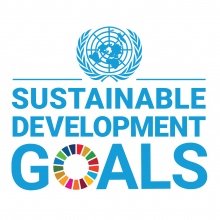VNRs at the Arab Forum for Sustainable Development…
Arab states have demonstrated a political and technical commitment to the implementation of the 2030 Agenda. In part, and as of July 2019, 16 Arab countries will have presented their Voluntary National Reviews (VNRs), delivering on the commitment to follow-up and review progress on the implementation of the Agenda. Those of countries span LDCs, middle-income countries, as well as countries of the Gulf Cooperation Council, and the State of Palestine. Two Arab countries would have presented their VNRs twice by 2019.
The Arab Forum for Sustainable Development, organized by ESCWA in collaboration with the League of Arab States and other regional UN entities, is becoming a critical and effective platform for policy makers as well as different stakeholders to discuss the VNR process. The AFSD is a high-level multi-stakeholder forum that brings together policy makers with civil society, parliamentarians, academics, youth, the private sector, media and other regional and international organizations.
One of AFSD’s main constituencies is a group of government officials directly involved in the implementation, follow-up of the 2030 Agenda and/or the preparation of VNRs. This group grows from year to year and now has a standing slot at the AFSD to reflect on the VNRs, their potential and limitations among different regional and national stakeholders, and to engage in peer learning and exchange of knowledge and lessons within the region.
Addressing the VNRs within a regional platform at the AFSD has highlighted common challenges, including but not limited to:
- Engaging different stakeholders in the VNR process, including civil society, parliamentarians, human rights institutions, the private sector and others
- Addressing the lack of awareness or varying levels of knowledge among different departments of the SDGs as well as the rights-based approach to sustainable development
- Using the VNR as a vector for increased coordination and integrated policy making
- Maintaining political will as well as engagement of different stakeholders beyond the preparation of the VNR
- Using the VNR as means to accelerate or improve implementation post-presentation at HLPF
- The lack of data, especially disaggregated data, which undermines the principle of leaving no one behind on the one hand, and the quantitative component of VNRs on the other
- Planning the VNR process itself in a timely and effective manner and abiding by the agreed upon guiding principles
In the Arab region, there is also the recurring concern regarding the capacity or feasibility of VNR preparations in countries in conflict, noting that of the 6 Arab countries that have yet to submit VNRs, 4 are conflict countries.
The need for a Community of Practice…
In its efforts to strengthen this dimension of the AFSD beyond the timespan of the actual Forum and recognizing the importance of the regional dimension of knowledge exchange and by implication capacity building, ESCWA will support the establishment of a Community of Practice (COP) on Voluntary National Reviews (VNRs) in Arab States.
The COP will provide an inclusive platform for government officials from Arab countries to discuss in a more concentrated manner and in a less public format issues of concern, pose questions and provide answers, access knowledge and information, make connections and create professional relationships to support and enhance their work on follow-up and review.
Building on the breadth of experiences across the regions, the COP will allow Arab countries to benefit from both commonalities and differences as the COP brings together Arab countries from different geographical and economic groups, and ones with different institutional setups for follow-up and review, allowing members to gauge more closely the efficacy and impact of different settings and dynamics. The COP will also bring together officials with varying degrees of experience in follow-up and review, VNR preparations, and the regional and global processes including AFSD and HLPF, potentially enhancing the quality of each other’s participation in those fora.
Composition
The Community of Practice will bring together government officials from Arab states who spearheaded the preparation of the VNR at a working level, as well as those currently engaged in such a role or will be pending their government’s declaration of intention to prepare the VNR. The Community will therefore continue to grow with time. To ensure members utilize the uniqueness of this platform, its membership will be limited to those officials and the secretarial support of ESCWA.
Terms of Reference
The TOR for the COP will be discussed with members and finalized by them to ensure that the COP is most responsive to their needs. It is expected, however, that those terms would include the following:
- Transferring knowledge among the different countries as well as different ministries, offices and departments
- Building new knowledge together as members tackle challenges and find solutions
- Creating a space for informal and unorganized learning and interaction among the practitioners
- Identify needs for capacity building in relation to VNR preparation
- Sharing information and resource materials--global, regional or national—on VNRs and follow-up and review of the 2030 Agenda, including for example national SDG reports
- Exploring possibilities for dialogue with non-governmental stakeholders on VNRs
Modalities of Engagement…
Engagement will be determined by members of COP and according to their needs. However, two main modalities are envisioned, feasible and sustainable:
- Exchange of views and practices through the virtual discussion platform at this web page;
- Face to face meetings—organized at the milestone meetings of regional and global FUR processes. These include:
- Meeting of the COP at the AFSD
- Meeting of the COP at regional workshops on the VNRs
- Meeting of the COP at the HLPF
In its next year, the COP may also elect a Chair of its own members on an annual basis and tailor a TOR for the role.
